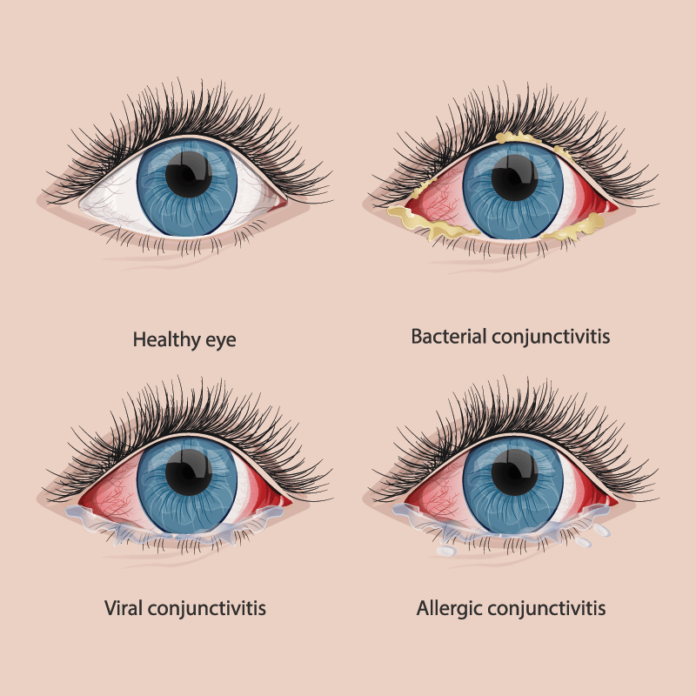Conjuctivitists: When small blood vessels in the conjunctiva become swollen and irritated, they’re more visible. This is what causes the whites of the eyes to appear reddish or pink. Pink eye also is called conjunctivitis.
Pink eye is most often caused by a viral infection. It also can be caused by a bacterial infection, an allergic reaction or — in babies — an incompletely opened tear duct.
Though pink eyes can be irritating, it rarely affects your vision. Treatments can help ease the discomfort of pink eye. Because pink eyes can be contagious, getting an early diagnosis and taking certain precautions can help limit its spread.
Symptoms
The most common pink eye symptoms include:
- Redness in one or both eyes.
- Itchiness in one or both eyes.
- A gritty feeling in one or both eyes.
- A discharge in one or both eyes that forms a crust during the night that may prevent your eye or eyes from opening in the morning.
- Tearing.
- Sensitivity to light, called photophobia.
Prevention
Preventing the spread of pink eye
Practise good hygiene to control the spread of pink eye. For instance:
- Don’t touch your eyes with your hands.
- Wash your hands often.
- Use a clean towel and washcloth daily.
- Don’t share towels or washcloths.
- Change your pillowcases often.
- Throw away old eye cosmetics, such as mascara.
- Don’t share eye cosmetics or personal eye care items.
Treatment
Pink eye treatment is usually focused on symptom relief. Your provider may recommend:
- Using artificial tears.
- Cleaning your eyelids with a wet cloth.
- Applying cold or warm compresses several times daily.
If you wear contact lenses, you’ll be advised to stop wearing them until treatment is complete. Your provider will likely recommend that you throw out soft contacts you’ve already worn.
Disinfect hard lenses overnight before you reuse them. Ask your provider if you should discard and replace your contact lens accessories, such as the lens case used before or during the illness. Also replace any eye makeup used before your illness.
In most cases, you won’t need antibiotic eye drops. Since conjunctivitis is usually viral, antibiotics won’t help. They may even cause harm by reducing their effectiveness in the future or causing a medicine reaction. Instead, the virus needs time to run its course. This typically takes around 2 to 3 weeks.
Viral conjunctivitis often begins in one eye and then infects the other eye within a few days. Your symptoms should gradually clear on their own.
Antiviral medicines may be an option if your viral conjunctivitis is caused by the herpes simplex virus.





























